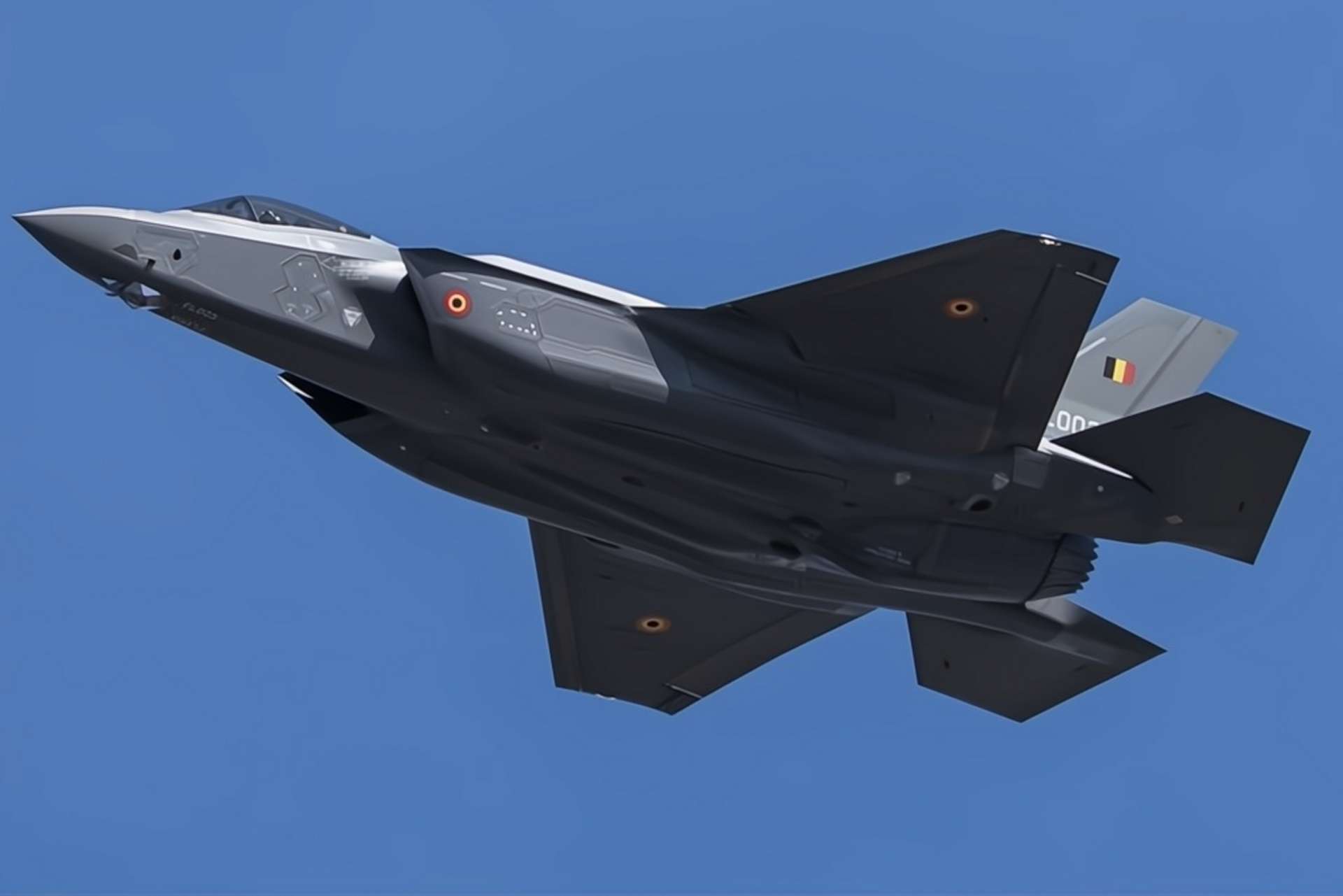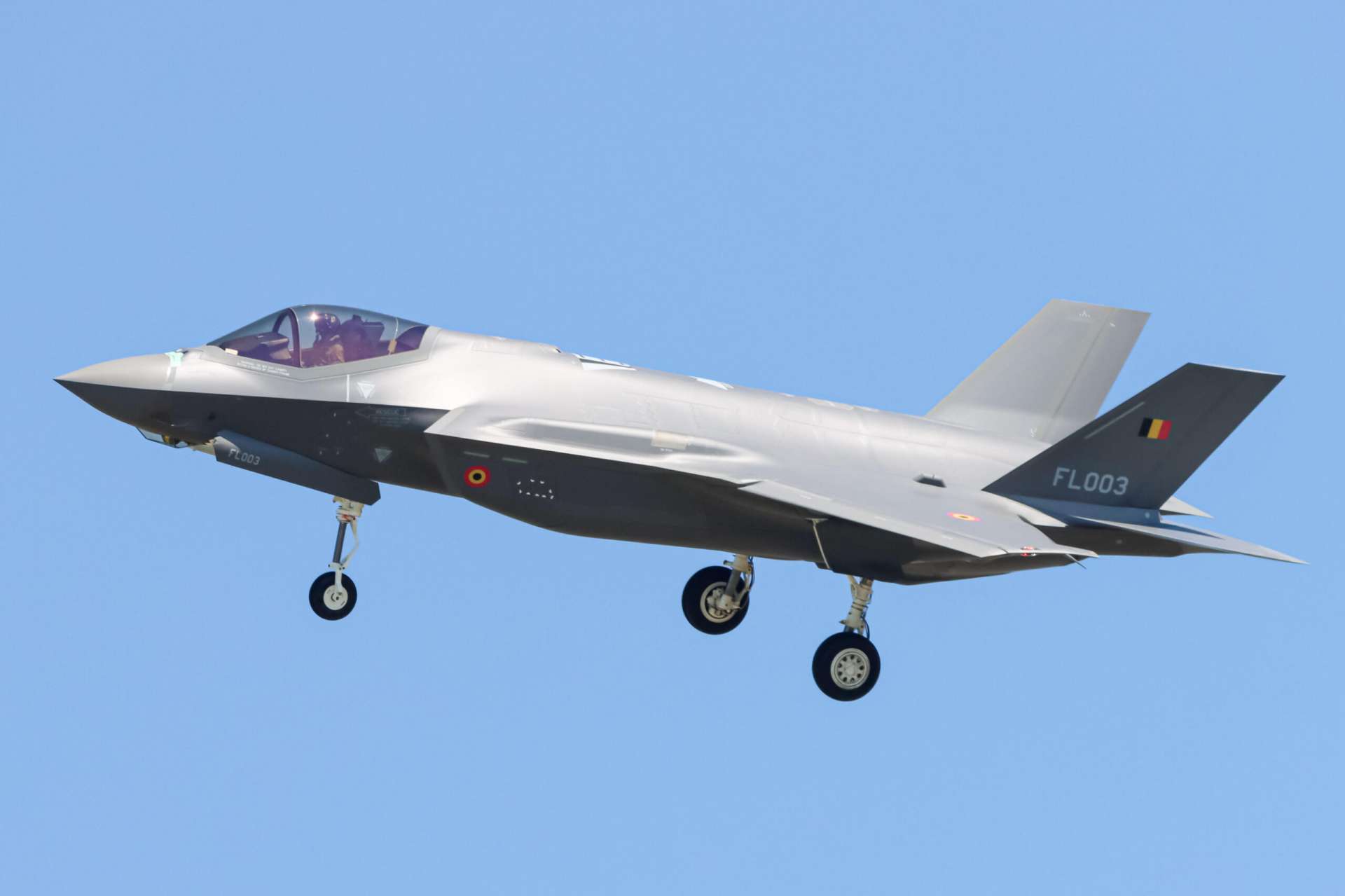Belgian Air Force’s new F-35A Lightning II stealth fighter completes inaugural flight


{loadposition bannertop}
Breaking news
{loadposition sidebarpub}
On May 14, 2024, the Belgian Air Force achieved a significant milestone with the successful maiden flight of its first F-35A Lightning II stealth fighter, part of a larger order of 34 aircraft intended to rejuvenate its aerial combat capabilities. Taking off from the Lockheed Martin facility in Fort Worth, Texas, the aircraft, designated as AY-03 and the third in the series, flew for about an hour.
Follow Army Recognition on Google News at this link
/* 468×15 data sheet menu top dark green */
google_ad_slot = “3500417247”;
google_ad_width = 468;
google_ad_height = 15;
// ]]>
/* top_468x60_fiche_technique */
google_ad_slot = “2746785843”;
google_ad_width = 468;
google_ad_height = 60;
// ]]>
Belgium’s decision to procure 34 F-35A Lightning II fighter jets from Lockheed Martin was made in October 2018, aiming to replace the aging fleet of 54 F-16 Fighting Falcon jets that have served the Belgian Air Force since the late 1970s. (Picture source: Facebook/The military aviation pictures and history)
Marking the beginning of a new era for the Belgian Air Force (BAF), this event was notably captured in photographs by aviation enthusiasts, showcasing the aircraft adorned with the Belgian roundel and the national flag on its tail, alongside the tail code FL003 (“Fighter Lightning 003”). Interestingly, the first Belgian F-35 aircraft to roll out in December 2023, designated AY-01 with tail code FL001, featured a slightly different rendition of Belgium’s national markings, likely due to the artificial lighting during the ceremony.
Following the example of the Royal Danish Air Force, which was the first to feature a subdued version of the colored roundel and national flag, Belgium opted for a subdued color scheme, incorporating tones of red, yellow, and black to create distinctive yet less conspicuous markings. Conversely, the Polish Air Force opted for low visibility checkerboards and markings to enhance operational stealth.
Currently, the initial batch of four Belgian F-35s is undergoing engine runs and additional flight testing. These aircraft will initially be based at Luke Air Force Base in Arizona, where Belgian pilots will undergo training alongside other F-35 customers’ pilots and maintainers. The first F-35 aircraft is expected to arrive in Belgium at Florennes Air Base in 2025, with plans to base additional F-35s at Kleine-Brogel starting in 2027.
Belgium’s decision to procure 34 F-35A Lightning II fighter jets from Lockheed Martin was made in October 2018, aiming to replace the aging fleet of 54 F-16 Fighting Falcon jets that have served the Belgian Air Force since the late 1970s. Belgium’s acquisition of the F-35 not only includes the aircraft but also extends to engines, mission simulators, and extensive training for both pilots and maintenance crews, representing a substantial investment of $6.53 billion for the country.
The original plan was to deliver four F-35s to Belgium per year from 2023 to 2030, to gradually replace its fleet of 54 F-16 Fighting Falcon jets, which are being phased out between 2023 and 2028. The COVID-19 pandemic caused delays, affecting Lockheed Martin and its subcontractors and altering the delivery schedule. The revised plan aimed for the first two Belgian F-35As to be delivered by the end of 2023, followed by two more in the first quarter of 2024, though further changes have occurred.

Following the example of the Royal Danish Air Force, which was the first to feature a subdued version of the colored roundel and national flag, Belgium opted for a subdued color scheme, incorporating tones of red, yellow, and black to create distinctive yet less conspicuous markings. (Picture source: Instagram/Gherardo Fontana)
Initially, the Belgian F-35s were to be built with the new Technology Refresh 3 (TR-3) upgrades, but these upgrades have been delayed. The TR-3 configuration is crucial as it includes both software and hardware upgrades necessary for the Block 4 upgrade and future improvements, serving as the IT backbone for all subsequent enhancements. All new production aircraft will receive TR-3, and it will be retrofitted on all F-35s already in service back to Lot 10. Lockheed Martin has confirmed that all the Belgian Air Force’s F-35s will be delivered in the TR-3 configuration.
Belgium joins a growing list of European nations to purchase the F-35 Lightning II to replace their aging fleets of fighter jets. As of 2024, twelve European countries, including the United Kingdom, Italy, the Netherlands, Norway, Denmark, Belgium, Poland, Finland, Switzerland, Germany, Portugal, and the Czech Republic, will now be operating this 5th generation stealth fighter jet. Like the F-16, the F-35 will remain a key component of NATO’s aerial defense strategy against potential threats, particularly from Russia.
The F-35 Lightning II, primarily developed by Lockheed Martin, is a fifth-generation multirole combat aircraft designed for a variety of military operations, including air-to-air, air-to-surface, and electronic warfare. Utilizing advanced stealth technology to reduce its radar cross-section, the aircraft aims to enhance its survivability in hostile environments. Equipped with integrated electronic systems such as the Electro-Optical Targeting System (EOTS) and Distributed Aperture System (DAS), it enhances reconnaissance and situational awareness capabilities, contributing to its effectiveness in missile defense and air combat. These systems enable the F-35 to monitor its surroundings and engage targets at significant distances.
Powered by a Pratt & Whitney F135 engine capable of delivering 43,000 pounds of thrust, the F-35 Lightning II can achieve a maximum speed of approximately Mach 1.6, equivalent to around 1,975 km/h. Regarding armaments, the F-35 can be outfitted with various weapons. It features internal bays capable of housing AIM-120C air-to-air missiles and GBU-32 JDAM guided bombs, among other munitions tailored for diverse mission requirements. With a standard weapon capacity exceeding 18,000 pounds, the F-35 can increase this load to 22,000 pounds in a configuration colloquially known as “beast mode.” The aircraft’s design incorporates stealth features to minimize its radar visibility, augmenting its effectiveness in combat scenarios where stealth capabilities are paramount.

{loadposition bannertop}
Breaking news
{loadposition sidebarpub}
On May 14, 2024, the Belgian Air Force achieved a significant milestone with the successful maiden flight of its first F-35A Lightning II stealth fighter, part of a larger order of 34 aircraft intended to rejuvenate its aerial combat capabilities. Taking off from the Lockheed Martin facility in Fort Worth, Texas, the aircraft, designated as AY-03 and the third in the series, flew for about an hour.
Follow Army Recognition on Google News at this link
/* 468×15 data sheet menu top dark green */
google_ad_slot = “3500417247”;
google_ad_width = 468;
google_ad_height = 15;
// ]]>
/* top_468x60_fiche_technique */
google_ad_slot = “2746785843”;
google_ad_width = 468;
google_ad_height = 60;
// ]]>
Belgium’s decision to procure 34 F-35A Lightning II fighter jets from Lockheed Martin was made in October 2018, aiming to replace the aging fleet of 54 F-16 Fighting Falcon jets that have served the Belgian Air Force since the late 1970s. (Picture source: Facebook/The military aviation pictures and history)
Marking the beginning of a new era for the Belgian Air Force (BAF), this event was notably captured in photographs by aviation enthusiasts, showcasing the aircraft adorned with the Belgian roundel and the national flag on its tail, alongside the tail code FL003 (“Fighter Lightning 003”). Interestingly, the first Belgian F-35 aircraft to roll out in December 2023, designated AY-01 with tail code FL001, featured a slightly different rendition of Belgium’s national markings, likely due to the artificial lighting during the ceremony.
Following the example of the Royal Danish Air Force, which was the first to feature a subdued version of the colored roundel and national flag, Belgium opted for a subdued color scheme, incorporating tones of red, yellow, and black to create distinctive yet less conspicuous markings. Conversely, the Polish Air Force opted for low visibility checkerboards and markings to enhance operational stealth.
Currently, the initial batch of four Belgian F-35s is undergoing engine runs and additional flight testing. These aircraft will initially be based at Luke Air Force Base in Arizona, where Belgian pilots will undergo training alongside other F-35 customers’ pilots and maintainers. The first F-35 aircraft is expected to arrive in Belgium at Florennes Air Base in 2025, with plans to base additional F-35s at Kleine-Brogel starting in 2027.
Belgium’s decision to procure 34 F-35A Lightning II fighter jets from Lockheed Martin was made in October 2018, aiming to replace the aging fleet of 54 F-16 Fighting Falcon jets that have served the Belgian Air Force since the late 1970s. Belgium’s acquisition of the F-35 not only includes the aircraft but also extends to engines, mission simulators, and extensive training for both pilots and maintenance crews, representing a substantial investment of $6.53 billion for the country.
The original plan was to deliver four F-35s to Belgium per year from 2023 to 2030, to gradually replace its fleet of 54 F-16 Fighting Falcon jets, which are being phased out between 2023 and 2028. The COVID-19 pandemic caused delays, affecting Lockheed Martin and its subcontractors and altering the delivery schedule. The revised plan aimed for the first two Belgian F-35As to be delivered by the end of 2023, followed by two more in the first quarter of 2024, though further changes have occurred.

Following the example of the Royal Danish Air Force, which was the first to feature a subdued version of the colored roundel and national flag, Belgium opted for a subdued color scheme, incorporating tones of red, yellow, and black to create distinctive yet less conspicuous markings. (Picture source: Instagram/Gherardo Fontana)
Initially, the Belgian F-35s were to be built with the new Technology Refresh 3 (TR-3) upgrades, but these upgrades have been delayed. The TR-3 configuration is crucial as it includes both software and hardware upgrades necessary for the Block 4 upgrade and future improvements, serving as the IT backbone for all subsequent enhancements. All new production aircraft will receive TR-3, and it will be retrofitted on all F-35s already in service back to Lot 10. Lockheed Martin has confirmed that all the Belgian Air Force’s F-35s will be delivered in the TR-3 configuration.
Belgium joins a growing list of European nations to purchase the F-35 Lightning II to replace their aging fleets of fighter jets. As of 2024, twelve European countries, including the United Kingdom, Italy, the Netherlands, Norway, Denmark, Belgium, Poland, Finland, Switzerland, Germany, Portugal, and the Czech Republic, will now be operating this 5th generation stealth fighter jet. Like the F-16, the F-35 will remain a key component of NATO’s aerial defense strategy against potential threats, particularly from Russia.
The F-35 Lightning II, primarily developed by Lockheed Martin, is a fifth-generation multirole combat aircraft designed for a variety of military operations, including air-to-air, air-to-surface, and electronic warfare. Utilizing advanced stealth technology to reduce its radar cross-section, the aircraft aims to enhance its survivability in hostile environments. Equipped with integrated electronic systems such as the Electro-Optical Targeting System (EOTS) and Distributed Aperture System (DAS), it enhances reconnaissance and situational awareness capabilities, contributing to its effectiveness in missile defense and air combat. These systems enable the F-35 to monitor its surroundings and engage targets at significant distances.
Powered by a Pratt & Whitney F135 engine capable of delivering 43,000 pounds of thrust, the F-35 Lightning II can achieve a maximum speed of approximately Mach 1.6, equivalent to around 1,975 km/h. Regarding armaments, the F-35 can be outfitted with various weapons. It features internal bays capable of housing AIM-120C air-to-air missiles and GBU-32 JDAM guided bombs, among other munitions tailored for diverse mission requirements. With a standard weapon capacity exceeding 18,000 pounds, the F-35 can increase this load to 22,000 pounds in a configuration colloquially known as “beast mode.” The aircraft’s design incorporates stealth features to minimize its radar visibility, augmenting its effectiveness in combat scenarios where stealth capabilities are paramount.





